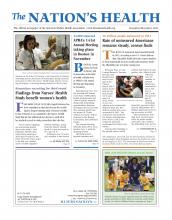Whether it happens in a school hallway or over social media, bullying is an unfortunate reality for many Americans — particularly children.
But while a traditional bully is less willing to admit to bullying, a recent study shows a person who bullies her or his siblings not only admits to it, but brushes it off as normal behavior.
Normalizing those kinds of behaviors is a concern of study co-author Robin Kowalski, PhD, a professor at Clemson University’s Department of Psychology whose research on sibling bullying was published May in the Journal of Interpersonal Violence.
“A lot of people will say, ‘Oh that’s what siblings do. They’re going to fight with each other,’” Kowalski told The Nation’s Health. “We know it can have very damaging effects on relationships between the siblings. Collectively it could have effects on self-esteem (and) academic performance. If we normalize it we’re ignoring all the negative effects.”
The study involved asking 27 pairs of adult siblings questions such as how often they were bullied during childhood and in what ways. Answers were ranked on a scale of one to five ranging from no bullying at all to being bullied several times a week. The pairs also wrote narratives about being bullied or being the bully. The study defined sibling bullying as a repeated verbal or physical episode that could include actions such as name-calling, pushing, arguing and kicking.
“They would talk about how bad the situation made them feel, and they would talk about how angry they got, and the embarrassment,” Kowalski said of the victims. “Embarrassment was a term that kept coming up over and over again, and humiliation was a common theme.”
Eight-five percent of the participants said they bullied their sibling and 78 percent said they were bullied. Verbal bullying occurred the most among victims, at 83 percent.
But 58 percent of the participants said that sibling bullying was acceptable and 85 percent said it was expected, the study said.
Kowalski said roughly half of the bullying victims typically told a parent, but most told parents not so they could intervene, but so they could get their siblings in trouble.
“What’s unique about that is with traditional bullying kids typically don’t tell, but if they do tell they’re not wanting to get the bully in trouble because they’re afraid the perpetrator would retaliate,” Kowalski said. “Sibling bullying is a very unique phenomenon.”
Siblings who are bullied have problems socializing with others, are more likely to be depressed and have behavioral problems, the study said. A pediatrician should ask questions during well visits about sibling bullying and educate families about the long-term impacts it could have on physical and mental health, Kowalski said.
“Sibling relationships are so important because that’s someone you live with,” Kowalski said. “Those relationships are with you without your life. They’re key. You’ve got a vast array of people with key relationships they could be missing out on or learning from.”
For more information on the study, visit http://jiv.sagepub.com/content/28/8/1726.
- Copyright The Nation’s Health, American Public Health Association









